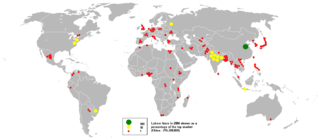Human resources are the people who make up the workforce of an organization, business sector, or economy. "Human capital" is sometimes used synonymously with "human resources", although human capital typically refers to a narrower effect. Likewise, other terms sometimes used include manpower, talent, labor, personnel, or simply people.

The Full Employment and Balanced Growth Act is an act of legislation by the United States government.

Industrialisation is the period of social and economic change that transforms a human group from an agrarian society into an industrial society, involving the extensive re-organisation of an economy for the purpose of manufacturing.

Small businesses are privately owned corporations, partnerships, or sole proprietorships that have fewer employees and/or less annual revenue than a regular-sized business or corporation. Businesses are defined as "small" in terms of being able to apply for government support and qualify for preferential tax policy varies depending on the country and industry. Small businesses range from fifteen employees under the Australian Fair Work Act 2009, fifty employees according to the definition used by the European Union, and fewer than five hundred employees to qualify for many U.S. Small Business Administration programs. While small businesses can also be classified according to other methods, such as annual revenues, shipments, sales, assets, or by annual gross or net revenue or net profits, the number of employees is one of the most widely used measures.

The Department of Trade and Industry (DTI) was a United Kingdom government department formed on 19 October 1970. It was replaced with the creation of the Department for Business, Enterprise and Regulatory Reform and the Department for Innovation, Universities and Skills on 28 June 2007.
Employment is a relationship between two parties, usually based on a contract where work is paid for, where one party, which may be a corporation, for profit, not-for-profit organization, co-operative or other entity is the employer and the other is the employee. Employees work in return for payment, which may be in the form of an hourly wage, by piecework or an annual salary, depending on the type of work an employee does or which sector she or he is working in. Employees in some fields or sectors may receive gratuities, bonus payment or stock options. In some types of employment, employees may receive benefits in addition to payment. Benefits can include health insurance, housing, disability insurance or use of a gym. Employment is typically governed by employment laws, regulations or legal contracts.
Productivity describes various measures of the efficiency of production. A productivity measure is expressed as the ratio of output to inputs used in a production process, i.e. output per unit of input. Productivity is a crucial factor in production performance of firms and nations. Increasing national productivity can raise living standards because more real income improves people's ability to purchase goods and services, enjoy leisure, improve housing and education and contribute to social and environmental programs. Productivity growth can also help businesses to be more profitable. There are many different definitions of productivity and the choice among them depends on the purpose of the productivity measurement and/or data availability.
Small and medium-sized enterprises (SMEs) or small and medium-sized businesses (SMBs) are businesses whose personnel numbers fall below certain limits. The abbreviation "SME" is used by international organizations such as the World Bank, the United Nations and the World Trade Organization (WTO).
Temporary work or temporary employment refers to an employment situation where the working arrangement is limited to a certain period of time based on the needs of the employing organization. Temporary employees are sometimes called "contractual", "seasonal", "interim", "casual staff", "outsourcing", "freelance"; or the word may be shortened to "temps". In some instances, temporary, highly skilled professionals refer to themselves as consultants.
"Iron rice bowl" is a Chinese term used to refer to an occupation with guaranteed job security, as well as steady income and benefits. The Chinese term can be compared to the similar English concept of a "job for life". Traditionally, people considered to have such positions include military personnel, members of the civil service, as well as employees of various state run enterprises.
Job security is the probability that an individual will keep his/her job; a job with a high level of job security is such that a person with the job would have a small chance of losing it.

One of the most dynamic and fastest growing sectors in the Philippines is the information technology–business process outsourcing (IT-BPO) industry. The industry is composed of eight sub-sectors, namely, knowledge process outsourcing and back offices, animation, call centers, software development, game development, engineering design, and medical transcription. The IT-BPO industry plays a major role in the country's growth and development.
An urban enterprise zone is an area in which policies to encourage economic growth and development are implemented. Urban enterprise zone policies generally offer tax concessions, infrastructure incentives, and reduced regulations to attract investments and private companies into the zones. They are a type of special economic zone where companies can locate free of certain local, state, and federal taxes and restrictions. Urban enterprise zones are intended to encourage development in deprived neighborhoods through tax and regulatory relief to entrepreneurs and investors who launch businesses in the area.

The economy of Pittsburgh, Pennsylvania, is diversified, focused on services, medicine, higher education, tourism, banking, corporate headquarters and high technology. Once the center of the American steel industry, and still known as "The Steel City", today the city of Pittsburgh has no steel mills within its limits, though Pittsburgh-based companies such as US Steel, Ampco Pittsburgh and Allegheny Technologies own several working mills in the Pittsburgh metropolitan area.

The End of Work: The Decline of the Global Labor Force and the Dawn of the Post-Market Era is a non-fiction book by American economist Jeremy Rifkin, published in 1995 by Putnam Publishing Group.

Labour in India refers to employment in the economy of India. In 2012, there were around 487 million workers in India, the second largest after China. Of these over 94 percent work in unincorporated, unorganised enterprises ranging from pushcart vendors to home-based diamond and gem polishing operations. The organised sector includes workers employed by the government, state-owned enterprises and private sector enterprises. In 2008, the organised sector employed 27.5 million workers, of which 17.3 million worked for government or government owned entities.
Ireland's County & City Enterprise Boards (CCEBs) were established in 1993, as companies limited by guarantee, during a time of high unemployment (15.1%) and limited opportunity for business. They were given statutory status under the Industrial Development Act of 1995. Essentially they were created to stimulate economic development and to cultivate an ethos of local entrepreneurship. While their role is primarily a local one within a broader national strategy, their importance has been raised to an international level by the emphasis placed on entrepreneurship, innovation, incubation and balanced regional development by the European Union.

Technological unemployment is the loss of jobs caused by technological change. Such change typically includes the introduction of labour-saving "mechanical-muscle" machines or more efficient "mechanical-mind" processes (automation). Just as horses employed as prime movers were gradually made obsolete by the automobile, humans' jobs have also been affected throughout modern history. Historical examples include artisan weavers reduced to poverty after the introduction of mechanized looms. During World War II, Alan Turing's Bombe machine compressed and decoded thousands of man-years worth of encrypted data in a matter of hours. A contemporary example of technological unemployment is the displacement of retail cashiers by self-service tills.
The Labor policy in the Philippines is specified mainly by the country’s Labor Code of the Philippines and through other labor laws. They cover 38 million Filipinos who belong to the labor force and to some extent, as well as overseas workers. They aim to address Filipino workers’ legal rights and their limitations with regard to the hiring process, working conditions, benefits, policymaking on labor within the company, activities, and relations with employees.








